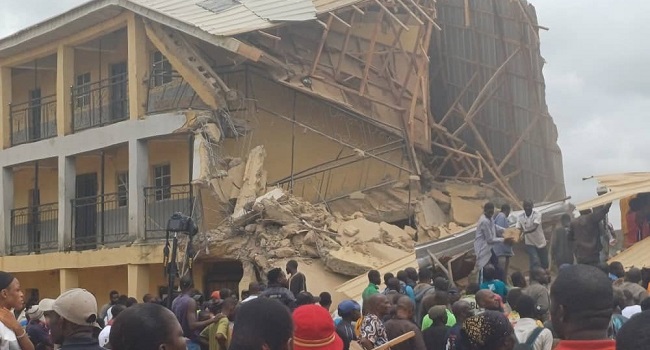Nigeria Building Collapses: 33 Deaths in 7 Months – Report
The Council for the Regulation of Engineering in Nigeria (COREN) claimed that 22 buildings collapsed in Nigeria between January and July 2024, killing 33 people.
Sadiq Abubakar, President of COREN, released these data during a news conference in Abuja titled “The Incessant Spate of Building Collapse in Nigeria in Recent Times – A Call for Sustainable Collaboration by All Stakeholders.”
According to the News Agency of Nigeria, Abubakar claimed that Lagos was responsible for 27.27% of the collapses, while Abuja and Anambra each had 18.18%. Ekiti and Plateau followed with 9.09% each, while Kano, Taraba, and Niger states had 4.55% each.
“Lagos leads in building collapse incidents,” Abubakar stated. Since 2012, over 91 structures in Lagos have collapsed, killing more than 354 people.
Since 1993, around 30 buildings in Abuja have collapsed, killing over 64 people and injuring many more.
Recent events include a collapse at DMGS Onitsha, Anambra State, on June 12, and a school (Saint Academy) in Plateau on July 13, which killed 22 pupils and injured 134, as well as a collapse in Kubwa, Abuja.
Abubakar stressed the importance of stakeholder thought and collaboration in addressing the challenge. “While we sympathize with the victims and their families, we commend emergency and security services for their prompt responses,” he told reporters.
According to Abubakar, the causes of building collapses vary by area but frequently include aged constructions, usage of inferior materials, structural flaws.
Illegal changes in building usage, unapproved floor additions, poor monitoring, and corruption.
He also noted problems with inadequate foundations and a lack of soil or geotechnical research.
Abubakar applauded state governments for forming panels to study collapses and suggested that parties collaborate to develop long-term solutions.
“This is not a time for blame, but for all professionals in the built environment to collaborate,” he stated.
He also expressed concern over illicit mining activities in residential areas, which endangers the structural stability of structures.
To combat building collapses, COREN has trained and licensed Engineering Regulation Monitoring (ERM) inspectors.
The council has reformed its Committee on Engineering Regulation Monitoring, with enforcement duties added in accordance with the modified COREN Act.
COREN has also established an ERM&E Task Force in regions such as Ibadan, Port Harcourt, Enugu, Kano, FCT, Gombe, and Lagos to address the issue thoroughly.



